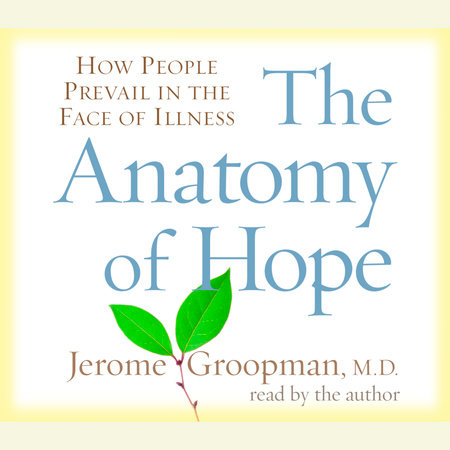The Anatomy of Hope Reader’s Guide
By Jerome Groopman


1. How did Dr. Groopman’s attitude towards hope change over the course of his career? Do you think doctors are responsible for their patients’ morale, or should they simply provide the cold, hard facts? Can you think of an example from your own life where either approach was effective?
2. What is the difference between false hope and true hope? After his experience with Frances Walker, why was Dr. Richard Keyes so resistant to his own treatment? Conversely, what allowed George Griffin and Barbara Wilson such optimism in the face of their illnesses? Was this false or true hope?
3. Groopman discusses the important relationships his patients create with either their loved ones or their God. Think of a time in your life when such relationships changed your outlook or got you through a painful or difficult situation.
4. What were the steps Dan Conrad took to develop a more hopeful attitude towards his cancer? Ultimately, why was it so important for Dan to have another cancer survivor as his model of hope?
5. How did Groopman learn from his own injury? Why do you think he includes so many stories where doctors become patients? Do you think it’s important to have hope in order to understand it in others? Is there a time in your life where empathy played an important role in recovery?
6. Define hope. Do you see it as something tangible—something with a recognizable anatomy—or is it different for different people?
7. Groopman examines the biology of hope by comparing it to the placebo effect. Do you think these two concepts are akin? Does believing in something make it true? Is recovery a reflection of hope or is the correlation less clear-cut?
8. Is there a way to help someone else find hope? What would you do if you were Esther Weinberg’s doctor? Her friend? Her rabbi? Have you ever known anyone who has lost hope entirely?
9. In the conclusion, Groopman admits that “the question—why some people find and hold on to hope while others do not—was what moved [him] to write this book.” Can that question be answered? If so, how? Are we predispositioned for affective behavior or is hope something we can rationally control?
10. Does Groopman’s argument extend to more than sickness? Where in your life have you seen hope as a remedy?
11. What do you take from this book? What is one thing you’d like to change about your own outlook and what is one thing you can do to improve those of the people around you?
Just for joining you’ll get personalized recommendations on your dashboard daily and features only for members.
Find Out More Join Now Sign In